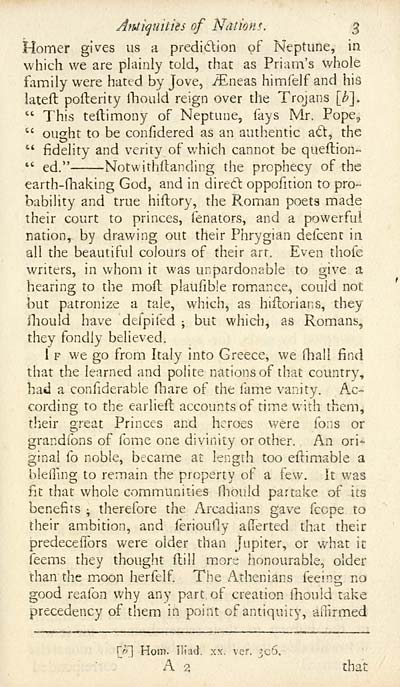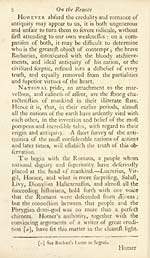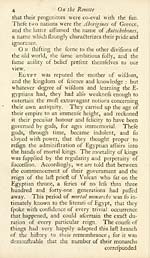Blair Collection > Critical dissertations on the origin, antiquities, language, government, manners, and religion, of the antient Caledonians, their posterity the Picts, and the British and Irish Scots
(41)
Download files
Complete book:
Individual page:
Thumbnail gallery: Grid view | List view

AfUiqnities of Nations. g
Homer gives us a predidion of Neptune, in
which we are plainly told, that as Priam's whole
family were hated by Jove, i^neas himfelf and his
lateft pofterity lliould reign over the Trojans [b].
" This tellimony of Neptune, fays Mr. Pope,
*' ought to be confidered as an authentic ad, the
*' fidelity and verity of v/hich cannot be queftion-
*' ed." Notwithftanding the prophecy of the
earth-fhaking God, and in diredl oppofition to pro-
bability and true hiftory, the Pvoman poets made
their court to princes, fenators, and a powerful
nation, by drawing out their Phrygian defcent in
all the beautiful colours of their art. Even thofe
writers, in whom it was unpardonable to give a
hearing to the mofi: plaufible romance, could not
but patronize a tale, which, as hiftorians, they
ihould have defpifed ; but which, as Romans,
they fondly believed.
I F we go from Italy into Greece, we (ball find
that the learned and polite nations of that country,
had a confiderable fliare of the fame vanity. Ac-
cording to the earliefl accounts of time w^ith them,
their great Princes and heroes were fons or
grandfons of fome one divinity or other. An ori-
ginal fo noble, became at length too eftimable a
blefllng to remain the property of a few. It was
fit that whole communities Hiould partake of its
benefits ; therefore the Arcadians gave fccpe to
their ambition, and ferioufly aderted that their
predecelTors were older than Jupiter, or what it
feems they thouglit ftill more honourable, older
than the miOon herfelf The Athenians feeing no
good reafon why any part of creation fhould take
precedency of them in point of antiquity, aPnrmed
r^'] Horn. Iliad. XX. ver. 306.
A 2 that
Homer gives us a predidion of Neptune, in
which we are plainly told, that as Priam's whole
family were hated by Jove, i^neas himfelf and his
lateft pofterity lliould reign over the Trojans [b].
" This tellimony of Neptune, fays Mr. Pope,
*' ought to be confidered as an authentic ad, the
*' fidelity and verity of v/hich cannot be queftion-
*' ed." Notwithftanding the prophecy of the
earth-fhaking God, and in diredl oppofition to pro-
bability and true hiftory, the Pvoman poets made
their court to princes, fenators, and a powerful
nation, by drawing out their Phrygian defcent in
all the beautiful colours of their art. Even thofe
writers, in whom it was unpardonable to give a
hearing to the mofi: plaufible romance, could not
but patronize a tale, which, as hiftorians, they
ihould have defpifed ; but which, as Romans,
they fondly believed.
I F we go from Italy into Greece, we (ball find
that the learned and polite nations of that country,
had a confiderable fliare of the fame vanity. Ac-
cording to the earliefl accounts of time w^ith them,
their great Princes and heroes were fons or
grandfons of fome one divinity or other. An ori-
ginal fo noble, became at length too eftimable a
blefllng to remain the property of a few. It was
fit that whole communities Hiould partake of its
benefits ; therefore the Arcadians gave fccpe to
their ambition, and ferioufly aderted that their
predecelTors were older than Jupiter, or what it
feems they thouglit ftill more honourable, older
than the miOon herfelf The Athenians feeing no
good reafon why any part of creation fhould take
precedency of them in point of antiquity, aPnrmed
r^'] Horn. Iliad. XX. ver. 306.
A 2 that
Set display mode to: Large image | Transcription
Images and transcriptions on this page, including medium image downloads, may be used under the Creative Commons Attribution 4.0 International Licence unless otherwise stated. ![]()
| Permanent URL | https://digital.nls.uk/76287062 |
|---|
| Description | A selection of books from a collection of more than 500 titles, mostly on religious and literary topics. Also includes some material dealing with other Celtic languages and societies. Collection created towards the end of the 19th century by Lady Evelyn Stewart Murray. |
|---|
| Description | Selected items from five 'Special and Named Printed Collections'. Includes books in Gaelic and other Celtic languages, works about the Gaels, their languages, literature, culture and history. |
|---|

